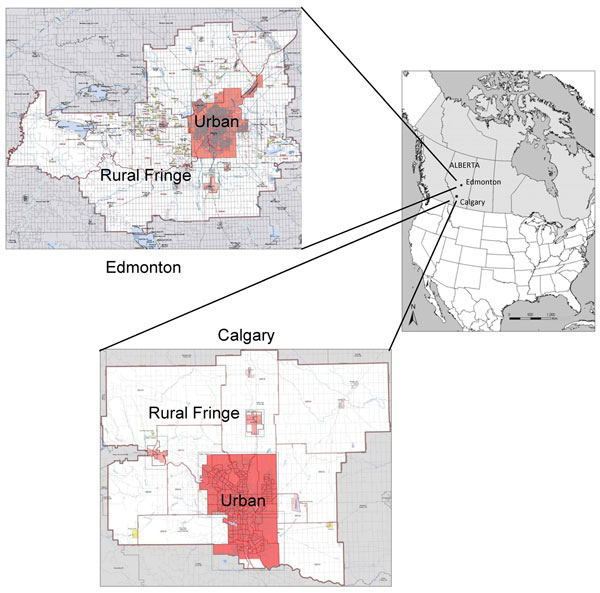Echinococcus multilocularis in Urban Coyotes, Alberta, Canada
Stefano Catalano
1, Manigandan Lejeune
1, Stefano Liccioli, Guilherme G. Verocai, Karen M. Gesy, Emily J. Jenkins, Susan J. Kutz, Carmen Fuentealba, Padraig J. Duignan, and Alessandro Massolo

Author affiliations: University of Calgary, Calgary, Alberta, Canada (S. Catalano, M. Lejeune, S. Liccioli, G.G. Verocai, S.J. Kutz, P.J. Duignan, A. Massolo); University of Saskatchewan, Saskatoon, Saskatchewan, Canada (K.M. Gesy, E.J. Jenkins); and Ross University, Basseterre, Saint Kitts, Saint Kitts, and Nevis (C. Fuentealba)
Main Article
Figure 1

Figure 1. . . . Calgary and Edmonton, Alberta, Canada, census metropolitan areas in which 91 coyote carcasses were collected during 2009–2011 and tested for Echinococcus multilocularis. Reference maps (2006) were obtained from the Geography Division, Statistics Canada (www12.statcan.gc.ca/census-recensement/2006/geo/index-eng.cfm). Urban core areas and surrounding rural fringes are indicated. For Edmonton, 5 (62.5%) of 8 carcasses were positive. For Calgary, 18 (20.5%) of 83 carcasses were positive: 9 (27.3%) of 33 from the rural fringe, 4 (14.8%) of 27 from the urban area, and 5 (21.7%) of 23 whose locations of collection were not accurate enough to be classified as urban or from the rural fringe.
Main Article
Page created: September 14, 2012
Page updated: September 14, 2012
Page reviewed: September 14, 2012
The conclusions, findings, and opinions expressed by authors contributing to this journal do not necessarily reflect the official position of the U.S. Department of Health and Human Services, the Public Health Service, the Centers for Disease Control and Prevention, or the authors' affiliated institutions. Use of trade names is for identification only and does not imply endorsement by any of the groups named above.
